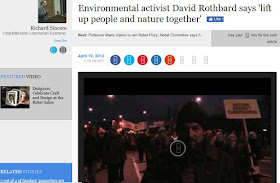Publisher's note: This article was originally published on Examiner.com on April 10, 2012. The Examiner.com publishing platform was discontinued July 1, 2016, and its web site went dark on or about July 10, 2016. I am republishing this piece in an effort to preserve it and all my other contributions to Examiner.com since April 6, 2010. It is reposted here without most of the internal links that were in the original.
Environmental activist David Rothbard says 'lift up people and nature together'
April 10, 2012 6:00 AM MST
Since 1985, the Committee for a Constructive Tomorrow (CFACT) has tried “to promote market-based and technological solutions to issues relating to environment and development,” according to its cofounder and president, David Rothbard.
Rothbard recently spoke to the Charlottesville Libertarian Examiner about CFACT, its mission, and its recent activities, including its outreach to college students across the United States.
CFACT’s offshoot organization, Collegians for a Constructive Tomorrow, is actually a return to the parent group’s roots.
Rothbard and his colleague, executive director Craig Rucker, started CFACT in the 1980s as a community organizing project on college and university campuses.
Battling Nader
“We actually got our start battling Ralph Nader on the college campuses,” Rothbard explained, with its specific goal to counteract “the negative check-off of mandatory fees that Nader was collecting" from students.
"We helped stop that [practice] in a lot of states but then, in some of the states, they said, ‘Look, we’re going to continue funding Ralph Nader but if you want to have a separate organization that can compete in the marketplace of ideas, go ahead.’”
The eventual result was Collegians for a Constructive Tomorrow, which began in 2001 and now has chapters on just over campuses in about 20 states. The group, Rothbard said, is “bringing a conservative message about environment and development to students across the country.”
The biggest issue on CFACT’s agenda for 2012 is energy, he said.
“There are those who would try to deprive us of the energy that supplies the most abundant, affordable energy for America,” Rothbard explained. “Things like coal and oil.”
CFACT supports renewable energy, he said.
“We think if it can compete in the marketplace, that’s great. If people can find ways to use solar and wind and other things, that’s great -- but the problem is when they’re trying to add on these costs to the most affordable, plentiful energy supply that we have in the name of science when there’s no good science to back it up. A lot of people will pay for that and that will not be good for our economy.”
Global warming
Another issue CFACT is addressing is climate change, although it does not resonate as it did a few years ago.
“Global warming has kind of faded a little bit,” Rothbard explained. “We’ve been in the midst of that battle now for, I guess, more than 20 years but as global warming’s faded, the agenda’s remained the same, which is energy suppression, but [that is] going under a different name, which is the promotion of green jobs and green energy.”
Asked what issue may be taking center stage 18 months from now, Rothbard did not hesitate to name sustainable development as “an issue that’s growing.”
He noted that grassroots groups are “beginning to hear about this thing called Agenda 21,” which is a plan supported by the United Nations and “major international environmental groups like Greenpeace and the Sierra Club.”
Agenda 21, he explained, “came out of the Rio Earth Summit that took place in Brazil in 1992. This June will be the 20th anniversary of that earth summit, taking place again in Rio.”
Along with Agenda 21, he said, “we’re starting to see this international push toward so-called sustainable development impacting local communities. It’s being pushed at the international level and that’s going to be an issue that’s growing in the coming 18 months.”
‘Make a difference’
Despite having run CFACT for more than a quarter century, Rothbard’s enthusiasm for the group’s activities is apparent when he describes plans for the near future.
“One of the reasons that we’re so excited about having a lot of students involved is,” he explained, that “we appreciate the fact that a lot of people care about the environment. They care about poverty, they care about public health, but we think it’s not enough just to care about it.”
Instead, he added, “we think you really need to be able to make a difference.”
Working with a board of scientific advisors, CFACT has been “able to promote positive, constructive solutions to these things.”
Moreover, he said, “we’re able to attract students from both sides, Republican and Democrat, liberal and conservative, because if you’re really interested in helping people, if you’re really interested in helping protect the earth, then what you [need] to do is promote prosperity for people,” and advocate policies “that will lift up people and nature together.”
Suggested Links
Charlottesville writer Christopher Horner examines environmental ‘Power Grab’
Questions for the President on the State of the Union
‘Big Roads’ author Earl Swift brings interstate story to Charlottesville
Grover Norquist discusses congressional government and GOP candidates
Belafonte criticizes Barack Obama on civil liberties in Charlottesville

No comments:
Post a Comment